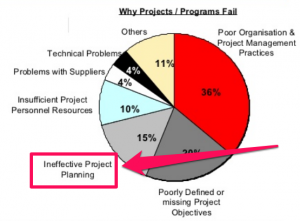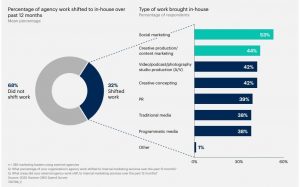
Career plans are important for both employees and managers and have a high ROI for both parties involved.
For employees, there are many benefits:
- It gives them a sense of pride
- It helps them relax, knowing they have a future at the company
- It makes them work harder to reach a goal
- It increases their happiness and engagement levels
For managers, there are many powerful benefits too:
- You get to develop your team
- You’ll attract millennials (they really value a career plan)
- You’ll keep your best employees with you
- You’ll lower turnover (turnover is crazy expensive)
And employees really want this.
In Deloitte’s 2014 Millennial Survey, 75% of respondents said that their organizations could do more to develop future leaders. They’re craving the idea of learning more and growing.
This is a huge opportunity to turn good employees into great employees.
When an employee plateaus, they can quickly become disengaged at work. They’ll be bored and feel like they’re not advancing in life. That personal growth is so important for happiness and engagement.
But an important question to ask is whose responsibility is it to create a career plan? Should employees do it? Managers? Both?
There seems to be some confusion on the answer to this question.
A really interesting study by a company called EdAssist explored the perceptions of both employees and managers of whose responsibility it is to drive career development. The results were very interesting:
- 74% of employees say managers should provide professional-development training, 71% say managers should identify job opportunities and career paths, and 68% say managers should provide career-advancement mentoring.
- On the other hand, 98% of managers say employees should continually update and improve their skills, 85% say employees should identify job opportunities and career paths, and 80% say employees should be responsible for building their job-hunting and career-planning skills.
Seems like both parties are just sitting on the sidelines waiting for the other to make a move.
This presents an interesting problem, and I think the truth is, both sides are right.
So let’s look at both sides of the argument.
What Employees Can Do
As much as I think managers and the entire organization should have programs for career development, I think employees have a certain responsibility to figure out at least part of the solution themselves.
Personal growth is a very real part of being engaged at work, and mastery is something everyone needs.
The most successful people are the ones that are constantly growing and learning new things.
The key to this is to set ambitious goals for yourself.
You can work with your manager to achieve those goals, but it’s important that you set them and that you’re accountable for them.
There are two goal-setting techniques you could use:
- SMART Goals
- OKRs
As a quick reminder, SMART stands for:
- Specific: It should be simple enough that a five-year-old would understand it
- Measurable: Set clear goals to know if you’re hitting your mark
- Attainable: Is this goal realistic?
- Relevant: How is this helping you advance your career?
- Time-bound: How long will this take? 1 year? 5 years? 3 months? Set a realistic timeframe that makes sense for you and your manager
Or use OKRs.
OKR stands for Objective and Key Results.
Set a vague, high-level objective like “I want to be the Director of Content” and then set two or three key, measurable results that could get you there, like:
- Write five eBooks that get at least 10,000 downloads
- Do 50 interviews with key influencers in my industry
- Take two courses online to make me a better writer
(Sidenote, these are all my actual personal OKRs)
To get you started, here are two questions I want you to ask yourself. Write down the answers for yourself, it’s a great exercise to do.
- Where do you want your career to be in two years?
- Where do you want your career to be in five years?
From there, I would share the answers with your manager. Ask them for feedback. Ask if there are any other things you could do like learn new skills, take classes, get certifications, have someone mentor you, go to events, etc.
Find out if they’ll be willing to help you financially with any of those courses or events. Most of the time they’ll say yes because it’s a solid investment in training for you.
At the end of the day, as much as companies can do, you’re responsible for advancing your own career.
Key Takeaways For Employees
- You’re the best person to advance your career
- Set short- and medium-term goals for yourself
- Get feedback from your manager on your goals
- Find out how your manager/company can help you achieve your goals
What Managers Can Do
It’s actually in your best interest to help employees develop a career plan.
As they develop their skills and their careers, they’ll (hopefully) use their new skills for you.
It’s also a great way to increase engagement on your team.
It shows employees that you value them enough to keep them around long-term and that you want to invest in their growth.
That sign of respect and sense of empowerment is enough to get them to be engaged.
Also, it helps you retain your best talent, which is so important and makes your life easier.
But it seems like most managers don’t get how important it is.
In a study by Randstad, 73% of managers agreed that fostering employee development is important, but only 49% of employees said leadership is doing anything about it.
This a missed opportunity for most companies.
So, what can managers do to help their employees with career development?
Think About Your Business Goals
Before helping employees with their career plans, you should think about your business goals to make sure that whatever path you send employees down, it will be aligned with that your organization wants.
Communicate Frequently With Your Employees
It’s likely that your employees have a career plan in mind or at the very least some aspirations of where they could see themselves in the future.
But they might not know how to get started. By talking to them frequently, you can get a sense of what they’re into and figure out how you can help.
Having regular one-on-ones is a good way to help with this.
Support Them However You Can
This could mean paying for classes they take online, spending an hour a week with them mentoring them, helping them connect with someone in another department if they want to learn more about something. There’s many different things you could do.
The point is you need to let them know that you’re there for them.
Set Goals And Follow Up
Set goals for employees based on the career plan that you’ve helped them create.
And of course make sure to follow up regularly and check in to see how things are going.
Any Tips On Creating A Career Plan For Employees?
Special thanks to my buddy Phil for submitting this question on Twitter to inspire this post:
@Officevibe How to make proper carrier plan with HR ?
— Philippe Lavoie (@philavoie) May 19, 2016
Any tips you can share with us about how you help employees with a career plan?
Business & Finance Articles on Business 2 Community(83)
Report Post







